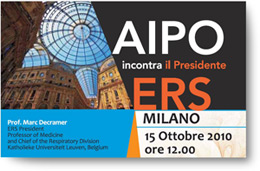- Pubblicazione il 20 Ottobre 2010

Marc Decramer, Professore di Malattie dell’Apparato Respiratorio presso l’Università di Leuven – Belgio e Presidente ERS, ha tenuto lo scorso 15 ottobre presso l’Ospedale San Carlo Borromeo di Milano una importante Conferenza sull’argomento:
“Diagnosi precoce e trattamento della BPCO. Stato dell’arte”
Considerata l’eccezionalità dell’evento e il privilegio di aver ospitato il Prof. Decramer in Italia, AIPO RICERCHE mette a disposizione di tutta la Comunità Scientifica Nazionale la sua Relazione.
Cliccare sul seguente banner per vedere la relazione

Marc Decramer and Christopher B. Cooper
Classical belief is that only smoking cessation, and not pharmacotherapy, beneficially affect disease progression in chronic obstructive pulmonary disease (COPD). In recent years, new data on Pharmacotherapy of COPD became available that shed new light on this question.
The present paper reviews these data critically in an attempt to put them in a proper perspective. The most impressive new data are subgroup analyses of two large-scale long-term trials. With these new data it is now clear that patients in GOLD (Global Initiative for Chronic Obstructive Pulmonary Disease) stage II benefit as much from pharmacotherapy as patients in the later stages of the disease. Effects on prebronchodilator and postbronchodilator forced expiratory volume in 1 s (FEV1), health-related quality of life, exacerbations and hospitalisations appear at least as pronounced in GOLD stage II as in the other GOLD stages. In addition, evidence suggestive of an effect on disease progression is available in the sense of an effect on rate of decline of FEV1, and trends for reductions in mortality. Finally, good evidence is available that, in contrast to conventional thinking, decline of FEV1 occurs at a considerably faster rate in the early stages of the disease. These data together with the high prevalence of co-morbidities from early in the disease onwards provide us with strong suggestive evidence for early intensive intervention in COPD. New trials, particularly demonstrating the detrimental effects of delaying treatment until later in the course of the disease, are required to render the evidence for early intensive intervention irrefutable.








